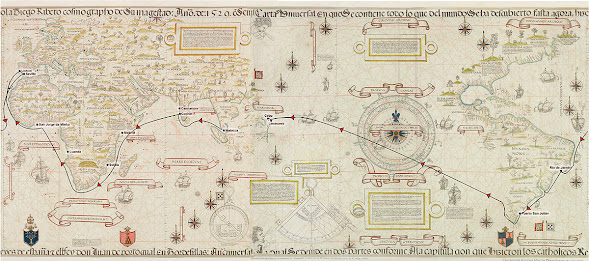 |
| Columbus (Source). |
Christopher Columbus (1451 – 1506). The most widely known and controversial of the early modern European explorers, Christopher Columbus has been made into a national hero in numerous countries, credited with “discovering America” and “the New World” and opening the way for European settlement and colonization. Today, the Genoese explorer's legacy is being re-evaluated, with historical records documenting his savage treatment of the indigenous peoples he came across and his “discovery” being seen as the beginning of colonization and genocides in the Americas by Spanish conquistadors. On one side of the controversy, statues of Columbus around the globe have been toppled or replaced and activists are pushing to amend school curriculums; on the other, defenders ranging from Italian Americans to many Mormons and Catholics actively defend the explorer’s legacy—overall a case study in how history is written, and repeatedly rewritten.
 |
| Map of Enrique of Malacca's circumnavigation: Malacca, Lisbon, Seville, Rio de Janeiro, Puerto San Julián, Guam, Limasawa, Cebu.[1] |
On March 28, 1521, Enrique of Malacca became the first person to complete a linguistic circumnavigation of the globe—he traveled so far in one direction that he reached a point where his own language was spoken. Enrique’s journey began a decade earlier following the sack of Malacca, when he was taken as a slave by Ferdinand Magellan. A teenager, he accompanied Magellan back to Portugal, then to Spain, and finally on the Armada de Molucca to locate a westward route to the Spice Islands. More about Enrique of Malacca.
